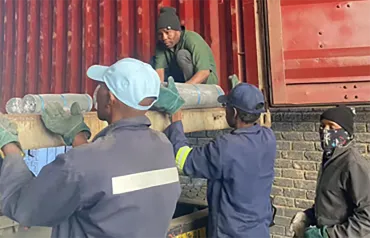Aug . 17, 2024 10:35 Back to list
High-Quality Iron Wire Production for Diverse Industrial Applications
The Essential Role of Iron Wire Manufacturers in Modern Industry
Iron wire is an essential material in various industries, from construction to agriculture. The importance of iron wire manufacturers cannot be overstated, as they play a critical role in producing high-quality wire that meets the diverse needs of their customers. As the demand for iron wire continues to rise globally, understanding the manufacturing process and applications of iron wire becomes increasingly important.
Iron wire can be produced in various forms, including galvanized, stainless steel, and coated varieties, each tailored to specific applications. Galvanized iron wire, for instance, is known for its durability and resistance to corrosion, making it ideal for outdoor applications such as fencing, agricultural use, and construction. Stainless steel wire, on the other hand, is preferred in environments exposed to harsher conditions, offering enhanced resistance to rust and wear.
The manufacturing process of iron wire typically involves several stages drawing, annealing, and coating. Initially, large rods of iron, often referred to as wire rods, are drawn down to thinner diameters. This process not only shapes the wire but also increases its tensile strength. Once drawn, the wire undergoes annealing, a heat treatment process that helps to relieve internal stresses and improve ductility. Finally, depending on the desired end product, the wire may be coated with materials like zinc or PVC to enhance its protective properties.
Quality control is paramount in iron wire manufacturing. Manufacturers must adhere to rigorous standards to ensure that the wire produced meets specific tensile strength, elongation, and surface finish requirements. Regular testing and inspections are conducted during the manufacturing process, and advanced technologies such as automated systems and quality monitoring are increasingly used to enhance consistency and reduce defects.
iron wire manufacturer

The applications of iron wire are vast and varied, reflecting its versatility. In construction, it is used for reinforcing concrete, tying rebar, and creating structural frameworks. In agriculture, iron wire is a common choice for fencing, trellising, and livestock containment. The automotive and electronics industries also utilize iron wire for components, ensuring that the wire's properties align with safety and performance standards.
Moreover, the rise of sustainable practices has prompted many iron wire manufacturers to explore environmentally friendly production methods. This includes recycling scrap metal and utilizing renewable energy sources in the manufacturing process. By adopting these practices, manufacturers not only contribute to reducing environmental impact but also align with the increasing demand for sustainable products from consumers and industries alike.
In recent years, the globalization of trade has expanded the reach of iron wire manufacturers. Companies are no longer limited by geographical boundaries and are now able to tap into international markets. This expansion presents tremendous opportunities for manufacturers to innovate and diversify their offerings, catering to a wider array of customer needs while fostering economic growth.
In conclusion, iron wire manufacturers play a vital role in today’s industrial landscape. Their ability to produce a wide variety of high-quality iron wire ensures that they meet the evolving needs of different sectors. With an emphasis on quality, sustainability, and innovation, these manufacturers are well positioned to continue supporting growth in numerous industries, while adapting to the challenges and opportunities of a rapidly changing world. As we look ahead, the importance of these manufacturers will undoubtedly continue to grow, driving advancements and facilitating progress across multiple domains.
-
Weather Resistance Properties of Quality Roofing Nails
NewsAug.01,2025
-
How Galvanised Iron Mesh Resists Corrosion in Harsh Environments
NewsAug.01,2025
-
Creative Landscaping Uses for PVC Coated Wire Mesh Panels
NewsAug.01,2025
-
Common Wire Nail Dimensions and Their Specific Applications
NewsAug.01,2025
-
Choosing the Right Welded Wire Sheets for Agricultural Fencing
NewsAug.01,2025
-
Anti - Climbing Features of Razor Wire Barriers
NewsAug.01,2025









